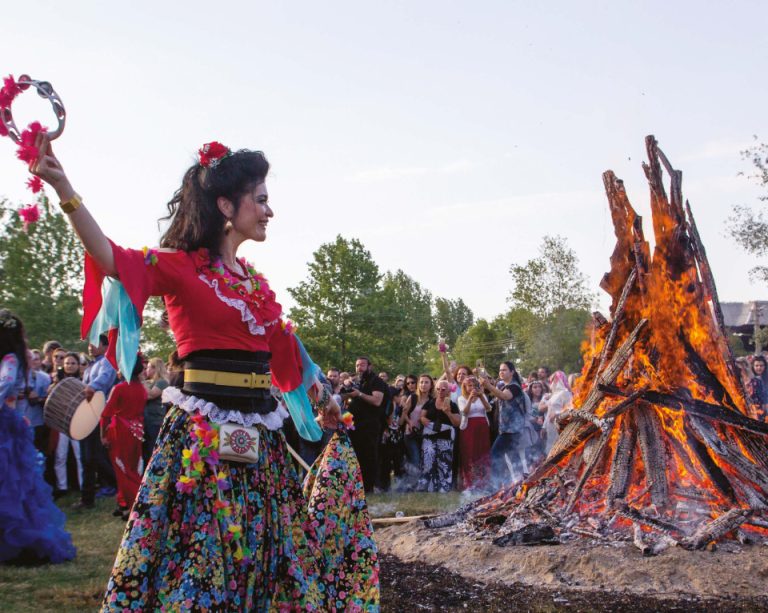Turkey boasts a rich tapestry of cultural and religious celebrations that reflect its deep-rooted traditions and diverse heritage. From religious observances to national festivities, these events play a pivotal role in uniting communities and preserving cultural values.
Ramadan and Eid al-Fitr (Ramazan Bayramı)
Ramadan, known as Ramazan in Turkey, is a holy month of fasting, prayer, and reflection for Muslims. The culmination of this month is marked by Eid al-Fitr, locally referred to as Ramazan Bayramı or Şeker Bayramı (“Festival of Sweets”). During this three-day celebration, it’s customary to visit relatives and friends, exchange gifts, and indulge in traditional sweets. Delicacies such as baklava, lokum (Turkish delight), and various confections are shared among loved ones. Serving Turkish coffee alongside these treats is also a cherished tradition.
Eid al-Adha (Kurban Bayramı)
Eid al-Adha, or Kurban Bayramı, is another significant religious festival in Turkey. Commemorating the willingness of Prophet Ibrahim to sacrifice his son in obedience to God, this festival involves the ritual sacrifice of an animal, usually a sheep or goat. The meat is then distributed among family, friends, and those in need. Similar to Ramazan Bayramı, this occasion is marked by family gatherings, visiting elders, and sharing traditional foods and sweets.
Mevlid Kandili and Other Holy Nights
Mevlid Kandili commemorates the birth of the Prophet Muhammad and is one of the five holy nights in Islam observed in Turkey. On this night, mosques are illuminated, and special prayers and sermons are held. It’s a time for reflection, recitation of the Mevlid (a poem honoring the Prophet), and acts of charity. Other holy nights, known as Kandil nights, include Regaip, Miraç, Berat, and Kadir, each with its own religious significance and associated traditions.
Cultural Celebrations
Hıdırellez: Welcoming Spring
Hıdırellez, celebrated on May 5th and 6th, is a traditional festival marking the arrival of spring. Rooted in ancient Turkic and Anatolian customs, it’s believed that Hızır (Al-Khidr) and İlyas (Elijah) meet on this day, bringing prosperity and health. Festivities include jumping over bonfires, making wishes, and preparing special dishes. Communities gather in parks and open spaces to sing, dance, and celebrate the renewal of nature.
Nevruz Bayramı: A Shared Cultural Heritage
Nevruz, meaning “new day,” is celebrated on March 21st, marking the vernal equinox and the beginning of the new year in many cultures. In Turkey, it’s observed with various customs, including cleaning homes, wearing new clothes, and preparing traditional foods. Communities engage in folk dances, music, and other cultural activities to celebrate renewal and hope.
National Holidays
From April 23rd to October 29th: Turkey’s National Days
Turkey observes several national holidays that commemorate significant events in its history:
- April 23rd: National Sovereignty and Children’s Day
This day marks the establishment of the Turkish Grand National Assembly in 1920. Dedicated to children, it emphasizes the importance of the nation’s youth and includes various activities and ceremonies. - May 19th: Commemoration of Atatürk, Youth and Sports Day
Commemorating Mustafa Kemal Atatürk’s landing in Samsun in 1919, which ignited the War of Independence, this day is dedicated to youth and sports, featuring athletic events and ceremonies. - August 30th: Victory Day
Celebrating the decisive victory in the Battle of Dumlupınar in 1922, Victory Day honors the Turkish Armed Forces with military parades and ceremonies. - October 29th: Republic Day
Marking the proclamation of the Republic of Turkey in 1923, this day is celebrated with nationwide events, including parades, concerts, and fireworks.
These festivals and holidays are integral to Turkey’s cultural fabric, reflecting the nation’s rich history, religious beliefs, and communal values. They offer a glimpse into the traditions that continue to unite and define the Turkish people.
For those interested in experiencing these traditions firsthand, especially the culinary delights associated with religious festivals, authentic Turkish sweets and coffee can be found at Exporgin.com. Indulge in the finest baklava, lokum, and Turkish coffee to bring a taste of Turkey’s rich heritage into your home.

